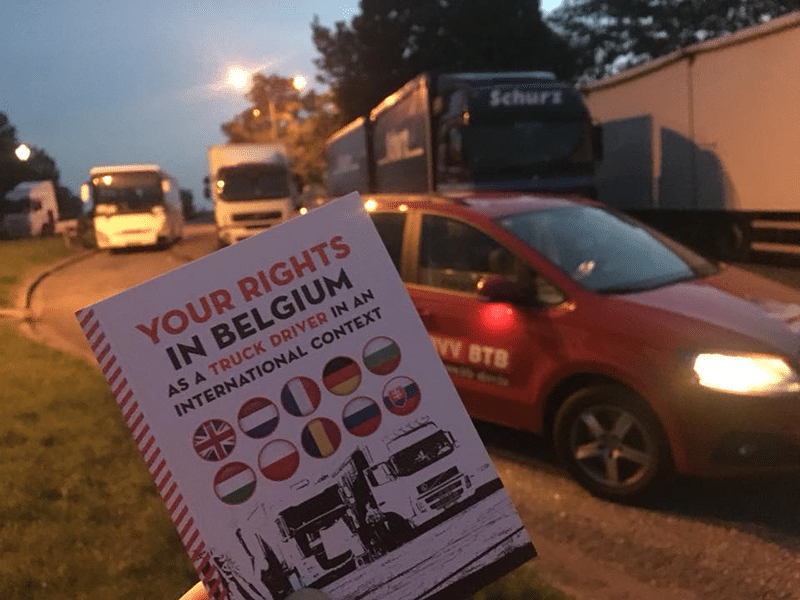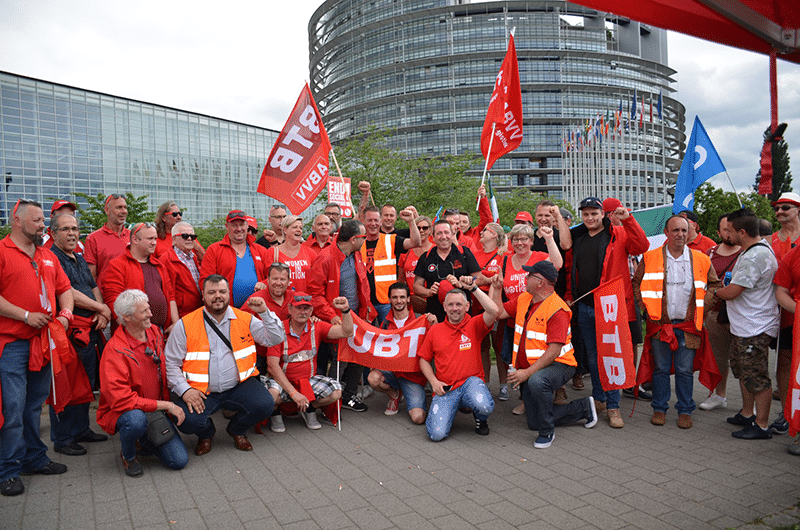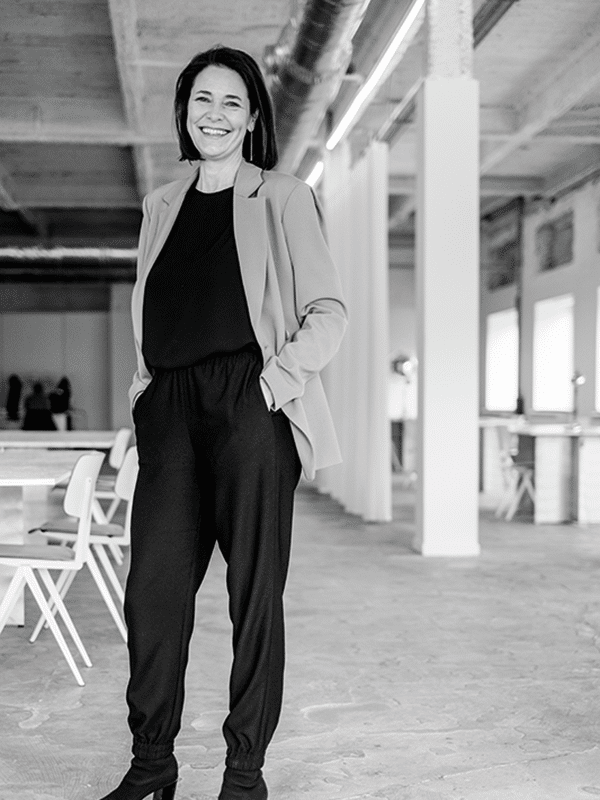6. Europe in the world
Interrelated, but not equal
The picture may be pretty to look at, but the reality behind it is not always so pretty either. Not everyone gets an equal start in life. Great differences remain. Access to healthcare, a dignified life, decent work, good education and so on is largely determined by place of residence, ethnicity, social class, gender, etc. The distances can be too great.
Migration: threat, challenge or opportunity?
My wife works as a volunteer in a Ghent-based organisation offering material assistance to refugees who ended up in Belgium: A heart for refugees. The stories she comes home with are often very confrontational and even heartbreaking. Almost all of the women she comes into contact with have fled terrible situations.
Often those refugees also testify about the danger on the escape route. Some try to cross from Africa to Europe by boats on the Mediterranean. The trouble is, the crossing is very dangerous. Since 2014, nearly 30,000 migrants have died or gone missing in the Mediterranean. I have visited Africa several times myself and have witnessed first-hand the poverty and hopelessness of many. So I understand why many Africans try to make the journey to Europe.
Recently, we drove past a slum with our trade union colleagues in Côte d’Ivoire. When we talked to our union comrades about the abject poverty that almost jumped out at us from that neighbourhood, their comment was: “Whoever ends up in the slums never gets out. This is the end of the line and you will never get out of it!”
The response of most ‘rich’ countries is to close the borders. They make it as difficult as possible for refugees trying to enter. Walls are being built along borders all over the world. Everyone remembers the main campaign theme in the election of Donald Trump: “We will build a wall along the Mexican border and the Mexicans will pay for it!” he shouted out to his fans. Hungary’s Victor Orbán also started building a 175-kilometre wall on his country’s borders back in 2015. And everyone knows the pushbacks from the Australian coast guard. It is a distorted reaction by countries that have relative prosperity and that want to protect it, to reserve it for their ‘own people’. The reasoning behind this is clear: we cannot handle mass migration, so we shield our prosperity from the fortune-seekers who try to come here.
Of course, we cannot and should not be blind to the real problems that mass migration brings to the countries where those migrants end up. There are differences in language, culture, lifestyles and religion that cause tensions, misunderstandings and sometimes conflicts. Extreme-right political parties and populists play on the fears of the indigenous population, fanning them and translating them into ‘hatred and envy’.
‘Extreme-right political parties and populists play on the fear of the indigenous population, fanning them and translating them into ‘hatred and envy’.’
More budgets for development and cooperation
It is up to us to break away from the simplism and provide alternative approaches. As a union, we can work out cooperation projects with fellow unions in countries that are struggling. Though that will only be a proverbial drop in the ocean. More is needed.
After World War II, a shattered Western Europe was rebuilt through a Marshall Plan. The motivations behind that plan can be debated at length. What is certain is that it was a massive investment plan designed to help the affected countries rebuild their economies and create wealth again. Taking that approach is imperative.
For example, if the causes of economic exploitation and underdevelopment in countries of Africa are not eliminated, Africans will continue to flee from famine and hopelessness. If we do not find peace in the many wars plaguing the planet, people will continue to seek their fortune in other countries where they think they will fare better.
The strange thing is that the very same parties that want to close the borders also want to cut the development and cooperation budgets. It is a fundamental choice that so-called developed countries will have to make. If we want to preserve our prosperity, we will also have to share it. If
our model of living together is to survive, we will have to ‘export’ it. Not with big words, but with practical actions. The 0.7 per cent of gross national product put forward as a target for development and cooperation in Belgium will be grossly insufficient.
But we are going backwards rather than forwards. “In 2021, Belgian official development assistance amounted to 0.43 per cent of gross national product. To achieve the sustainable development target by 2030, that figure needs to rise to 0.7 per cent. That target will not be achieved if we continue with the trend since 2000. Official development assistance is therefore evolving unfavourably.” This much is stated on the Belgian government’s official site.

Migration as an opportunity
And what about if we used migration as an asset? Because the population in the West is ageing at a rapid pace. Without migration, our pensions will become unaffordable, our economy will continue to build labour shortages and our model will automatically be put under pressure, if we don’t allow people to come in from the outside.
This means it will be important for us to work on the undeniable problems that go hand in hand. In August 2023, the employer organisation Voka launched a call for help: Belgian companies have a labour shortage and they think they can find it in India and Mexico. Isn’t it time, then, to think deeply about migration, and how best to integrate the newcomers as they arrive? As has happened with previous waves of migration: “We can do it!” Investing in education and training is one of the means of achieving that aim. And that is not only a political challenge: it is also a responsibility for employers. It’s called: investing in the future!
a. China as a new global player
China became an economic powerhouse over the space of 40 years. Today, it is a global economic player. China’s economy has also become a market economy. A state-led market economy. China joined the World Trade Organisation in 2001, after which Chinese exports again grew very rapidly after previous growth spurts.
Although doomsday reports have been launched lately about the state of China’s economy, it is and remains the world’s second-largest economy. According to economist Houze Song of the Paulson Institute in Chicago, China’s growth rate will reach 4 per cent by 2023, higher than in wealthy OECD countries. But it is true that growth in China has been below expectations lately. The fact that China no longer publishes figures on its rapidly growing youth unemployment is no doubt a sign of things to come. At the same time, the political system remains a very centrally led communism, with the Communist Party keeping tight control. The Belt and Road Initiative, the expansion of new Silk Roads, is an example of this. This is the programme through which China is investing in foreign rail and land links to China: the Silk Road projects. Also in Africa and Asia. Wherever you go in Africa, China is highly active. Both in Kenya and Côte d’Ivoire, where the Belgian transport union has projects, China’s presence is evident. In Kenya, the port of Mombasa now has a new container terminal, thanks to Chinese support, and the very expensive, railway line between Mombasa and Nairobi was rebuilt with Chinese money. The port at Mombasa becomes the collateral when Kenya can no longer repay the loan. It is a strategy that fits into the Belt and Road Initiative: gaining possession of port infrastructure. China is clearly looking in Africa for raw materials, ore, etc. and these infrastructure works, or acquiring existing infrastructure, play an important role in this.
Another of the Chinese government’s project is Made in China 2025, the project by which China aims to become number one in the world in ‘high- tech manufacturing’.
China is also investing massively in Europe. Cosco is a 24.9 per cent owner of the port terminals in Hamburg. In 2022, Cosco owned 357 terminals and 36 ports worldwide.
And what about Huawei? The United States has been investigating alleged spying by the technology company on behalf of the Chinese government for years. US companies are no longer allowed to trade with Huawei. The Netherlands also launched an investigation.
According to Professor Bruno Merlevede of the University of Ghent, more than half of Chinese investment in Europe in the past decade has been by companies and investment funds linked to the Chinese government. It serves the larger goal of building China into a modern, advanced superpower whose position is not contested by others. Economy and politics are therefore often mixed together. This also gives the Chinese government indirect political power in Europe. Through the economic influence it generates in European member states and through trade relations that weigh on political decision-making. As China continues to build its economic position globally, those who thought China would move towards a more democratic political system through that economic integration have come back empty-handed.
To push on an already open door: human rights in China are worse than poor. The various crackdowns are not just on minority groups such as the Uighurs. Free trade unions also don’t stand a chance within the current political framework in China. It is enough to look at the militarist-run factories for iPhones belonging to Foxconn, a Taiwanese electronics manufacturer. Between 2010 and 2013, dozens of workers have committed suicide at Foxconn sites: a reaction to the hard work and daily humiliations by management. “Every day started with an unpaid meeting at twenty past seven; twenty minutes later my shift started and I worked overtime until twenty to eight in the evening,” underage worker Tian Yu told an article in the Belgian daily De Standaard. “I got severe eye pain from all those hours spent tracing scratches on glass screens and could only go to the toilet occasionally. When there was a problem with my contract, I was not paid and no one wanted to help me. I was desperate and could no longer think clearly.” In the end, Yu jumped out of her dormitory on the fourth floor. She survived the suicide attempt.
If we do not want China to also export its ‘social’ politics and its vision of industrial relations, we will have to be critical. Certainly more critical than we are at the moment. Social clauses, social dialogue and the recognition of free trade unions should become an integral part of trade agreements.

b. Elections in the United States
Who would have ever dared to predict that on 6th January 2021, the US Capitol would be stormed? Who would have thought that the country that stands for the democratic idea would face an attempted coup d’état? Not a coup carried out by the army (which deliberately kept its distance that day), but by a crowd whipped up by the incumbent president who lost the election and who did not want to admit it. Day after day, right through to the present day, details of how Donald Trump co-ordinated the putschists are still leaking out. In its final report, the US House committee left no doubt. In an 800-page report based on 1,200 interviews with eyewitnesses, the committee says Donald Trump’s involvement is abundantly clear. Donald Trump, according to the members, is the main culprit and should therefore be prosecuted. That the accused ex-president denies, disputes and ridicules the committee’s work is telling. That a large proportion of his constituents do the same is a logical consequence. But that an equal share of the Republican party follows him is downright worrying.
The good news in 2020 was that the American people sent the incumbent president home via the ballot box, opting for a different policy. A policy embodied by the current US president. This has enormous significance both domestically and abroad. According to our union colleagues in the US, the Biden administration is the most union- friendly in a long time.
The United States, like Europe, will hold elections for a new president in 2024. The stakes are crucial. Either Trump returns to power, with all the disastrous consequences that that entails, or the Democrats remain in power and a more union- friendly line can be pursued.
Of course, the Biden administration is not a ‘union administration’. Even under the current Democratic president, we see many labour disputes and US legislation remains not union-friendly. Just think of the hard fight the International Brotherhood of Teamsters had to wage with UPS over the renewal of their collective labour agreement. Or how laborious the formation of a union was at Amazon. Moreover, in many (autonomous) states in the US, there are a lot of socially dangerous operations going on. For instance, in many states, things are made easier for young people to work. Whereas they might be better off in school.
c. Superpowers in competition
The fact that there is a cut-throat battle going on between the United States and China for both economic power and political dominance and influence is certain.
Furthermore, Washington wants revenge for China joining the World Trade Organisation WTO, which most US politicians now see as a ‘historic mistake’. The US does not grant China an edge in the most profitable economic sectors. Whether we like it or not, that struggle affects us all, globally.

°18/11/1969. Belgium.
Member of the European Parliament for the Vooruit party. Coordinator of the Committee on International Trade for the Social Democratic Group in the European Parliament. Former Secretary of State for Work Organisation and Wellbeing at Work and Flemish Minister for Mobility, Social Economy and Equal Opportunities.
‘Cooperation and solidarity must be at the heart of the role we play in the world.’
To change the world, you have to start with yourself. To strengthen our role in the world, we need to know with certainty what we want. We must also put those plans into practice. For Europe, this means taking the lead in the global fight against climate change. Not only with an ambitious climate programme, but also with a strong social programme. That’s what we’re doing by focusing on a sustainable economy with high-quality, well-protected jobs. That’s why we need to invest in our education, social security and healthcare.
What role does Europe want to play? To be a player or be played with? The European Union must give a clearer answer to this question. Europe must finally pursue a genuine foreign policy based on our fundamental values: peace, security, democracy, cooperation, the rule of law, human rights and sustainable development. All this also requires a healthy dose of realism. We represent a bloc of some 450 million people, out of a total world population of nearly 8 billion. So we must not presume to think that we can single-handedly reshape the world order. However, we must be active in steering it in the right direction. And in a more assertive way than we do today. We must do more to combat social dumping and the exploitation of workers. And
we need to strengthen the position of trade unions across the European Union.
Based on this programme, Europe has the opportunity to create links with the rest of the world, rather than opt for dependence. We will never be as brutal a power as China or the United States. Nor can that be our ambition. Europe is not alone in seeking its place on a redesigned world stage, nor is it the only continent to realise that it needs to assert itself more strongly. This could be the common denominator of Europe’s new political direction.
Cooperation and solidarity are central to this. Europe cannot be a straitjacket for its partner countries, but must be a positive force for peace, security and social progress. When we cooperate, we do so with respect for human rights and with a clear social agenda. By putting an end to forced labour and child labour, by taking action to achieve better working conditions for workers and by sharing our knowledge and technologies. And all the while respecting the environment and the climate. Our overriding ambition must be to work together to step up the fight against climate change on a global scale, and to give our partners the opportunity to create a sustainable economy now. And, above all, we must have respect for one other. An equitable partnership is one that benefits both partners and promotes human rights, peace and democracy throughout the world.
This is the role that the European Union must play in the world. Realistic, assertive and united. In this way, we will become less vulnerable and we will make a difference. In geopolitics and in the daily lives of millions of people. In Europe and beyond.
